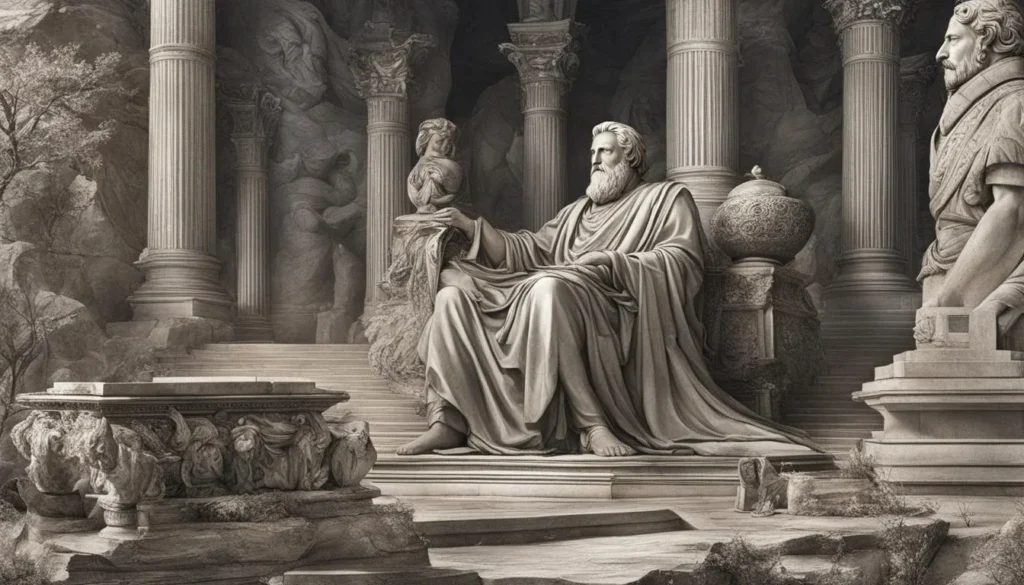Seneca (4-65 AD) was a roman philosopher and one of the greatest figures in Stoicism. His life and philosophical teachings have influenced our society to this day. In this article, we will explore the life of Seneca and his stoic philosophy, highlighting his teachings on wisdom, virtue, reflection and search for self-improvement e self control emotional.

Main points of this article:
- Seneca was a roman philosopher and one of the greatest figures in Stoicism.
- He wrote a series of philosophical works, covering topics such as morality e ethics.
- Seneca argued that the stoic wisdom consisted of living in accordance with nature and seeking virtue.
- His works have influenced modern society in various fields, such as psychology and philosophy.
- Seneca left a lasting legacy through his reflections on search for wisdom and the virtuous life.
Seneca: A Roman Philosopher of Stoicism
Seneca was born in Córdoba, in Hispania Betica, in 4 BC, and lived during the Roman Empire. He was a Stoic philosopher and wrote a number of philosophical works, such as the essay and the epistles. His works address themes such as morality, ethics, reflections on life and death, and are important sources for understanding the stoic philosophy. Quotes from him are widely known and continue to influence people to this day.

Seneca He left a significant legacy of philosophical works that continue to be studied and appreciated. His writings are a valuable source of stoic wisdom e reflection existential. They deal with fundamental questions of human life, such as the search for virtue and the importance of reflection on mortality. To the Seneca's works provide practical guidance for living a virtuous life and finding inner serenity.
His epistles offer insights into a variety of topics, from the importance of friendship and self control emotional until the need to seek the wisdom and virtue. His philosophical works profoundly influenced Roman society and continue to be relevant today.

Seneca's Works and Epistles
As Seneca's works cover a wide range of subjects and offer in-depth insight into the stoic philosophy. Their essay explore themes such as virtue, search for wisdom and the relationship between the morality and happiness. His epistles, written in letter format, provide practical advice on how to apply the principles of stoicism in everyday life.
| Seneca's works | Overview |
|---|---|
| Letters to Lucilius | A collection of epistles in which Seneca covers a wide range of topics, such as philosophy stoic, the search for wisdom and the importance of friendship. |
| About the Brevity of Life | An essay that reflects on the fleetingness of human life and the importance of enjoying every moment. |
| Da Tranquility from the soul | A work that explores the search for inner serenity and self control emotional. |
These are just some of Seneca's best-known works, but he wrote many others essay and epistles throughout his life. His works continue to be studied and appreciated for their wisdom timeless and practical application.
Seneca's Principles of Stoicism
Seneca believed that the practical stoicism it was the key to a virtuous and fulfilling life. He argued that the stoic wisdom it consisted of living in accordance with nature and seeking virtue in all actions. For Seneca, virtue was essential to achieving happiness and tranquility mental. He argued that passions and vices were obstacles to the development of a virtuous spirit.
According to Seneca, the pursuit of virtue should be the highest priority in a person's life. He believed that Stoic wisdom could be achieved through daily practice and constant reflection on our actions and choices. Seneca applied these principles to his own life, seeking to live in accordance with the stoic virtues and sharing his teachings through his works.
A stoic morality it was also fundamental to Seneca. He emphasized the importance of living according to ethical and moral principles, treating others with respect, fairness and compassion. For Seneca, a person's life should be guided by virtue and the desire to contribute to the well-being and harmony of society.

Seneca's Principles of Stoicism
| Principles of Stoicism | Explanation |
|---|---|
| Living according to nature | For Seneca, living in accordance with nature means accepting things as they are and not being carried away by the desire to control or modify the world around you. |
| Seek virtue | Virtue is the ultimate goal of life and should be the main focus of all actions and decisions. The pursuit of virtue involves developing qualities such as wisdom, courage, justice and self-control. |
| Reflect on your own actions | Seneca highlighted the importance of daily reflection on our actions and choices. Through reflection, we can identify areas where we can improve and develop greater awareness of ourselves. |
| Practice the morality | For Seneca, morality was fundamental to a virtuous life. He believed that we should treat others with respect, fairness and compassion, always seeking to act in the most appropriate way. ethics possible. |
Seneca's Works and Essays
Seneca left behind a significant legacy of philosophical works covering a wide range of topics. His writings are a rich source of knowledge and offer profound insights into the search for wisdom and the self knowledge. The Seneca's works are considered pillars of philosophy stoic and continue to inspire and influence people to this day.
One of Seneca's best-known works is his collection of essays, where he explores existential and ethical questions in an insightful way. In his essays, he discusses the importance of reflecting on life, the search for virtue and overcoming the challenges we face. To the existential reflections present in his works invite readers to a journey of self knowledge and personal growth.

In addition to essays, Seneca also wrote about ethics, morality, and virtuous living. His writings offer practical guidance on how to live a meaningful life and seek wisdom. He shares valuable advice on how to cultivate virtue, deal with adversity, and achieve success. tranquility interior. His works are a treasure trove of wisdom that continues to resonate with people seeking a more meaningful and authentic life.
Seneca's Main Works:
- Letters to Lucilius
- About the brevity of life
- Of the benefits
- About anger
- About the tranquility of the soul
Seneca's works are a precious source of inspiration and knowledge for those who wish to explore the principles of Stoicism and apply them to their lives. His teachings about the search for wisdom and the self-improvement They continue to be relevant to this day, and their influence on philosophy and society is undeniable.
| Publication Year | Construction |
|---|---|
| 49 AD | Letters to Lucilius |
| 55 AD | About the brevity of life |
| 60 AD | About anger |
| 62 AD | Of the benefits |
| 63 AD | About the tranquility of the soul |
Seneca's Influence on Modern Society

A influence of Seneca in modern society is indisputable. His works and teachings continue to impact and inspire people around the world. His philosophy, based on stoicism, offers valuable insights into existential questions, ethics and the search for wisdom.
“Life is not short, but we are the ones who make it that way by wasting it.”
Seneca's reflections have been applied to various areas of society, from the workplace to personal relationships. His pursuit of virtue, emotional self-control, and stoic wisdom offer practical guidance for meeting the challenges of everyday life.
In addition, Seneca quotes they continue to resonate with modern audiences, spreading across social media and inspiring people to live more conscious and virtuous lives. His wisdom transcends time and continues to be relevant today.
In short, the influence of Seneca in modern society is profound and lasting. His teachings on the pursuit of wisdom, virtue and emotional self-control have the power to transform lives and inspire people to live according to his principles.
| Benefits of Seneca's influence on modern society: | Examples |
|---|---|
| Greater awareness of the importance of seeking wisdom | People are seeking knowledge and reflection to improve their lives and find meaning in their actions. |
| Promotion of virtuous and ethical living | A stoic ethics of Seneca inspires people to act virtuously and make ethical decisions in their lives. |
| Development of emotional self-control | Seneca's reflections on the importance of controlling emotions help people to better deal with stress and uncertainty. |
Seneca's Famous Phrases and Quotes
Seneca is known for his impactful phrases and quotes. His words offer deep insights into topics such as the importance of reflection, the search for wisdom and virtue. Seneca's famous quotes are widely shared and have the power to inspire and motivate people on their journey of self-improvement and personal growth.
“Life is not short, we make it that way.”
This phrase from Seneca reminds us that time is not what determines the brevity of our lives, but rather the way we live it and enjoy each moment. She invites us to reflect on how we are using our time and to value each moment, seeking to live meaningfully and in search of wisdom.
Seneca's teachings
- Don't wait for others to seek happiness. It is within your reach, within you.
- Wisdom is only achieved when we learn to know ourselves and deal with our own thoughts and emotions.
- Virtue is the path to inner tranquility and true happiness.
- Adversity is an opportunity for growth and learning.
- Life is a constant exercise in self-improvement.
The phrases and teachings of Seneca They have the power to make us reflect on the importance of living a virtuous life, seeking wisdom and inner tranquility. His teachings remain relevant today and inspire us to be better every day.

Seneca's Practical Life: An Example of Stoic Wisdom
| Roman philosopher | Virtuous Life | Pursuit of happiness | Stoic Principles |
|---|---|---|---|
| Seneca | Example of applying the principles of Stoicism in everyday life | Found happiness in the pursuit of virtue | Lived according to stoic virtues |
Seneca was a prominent figure in Stoicism, standing out for his practical life based on Stoic principles. He was able to apply the teachings of Stoicism to his own life, becoming an inspiring example of Stoic wisdom. Seneca sought to live according to the stoic virtues, such as prudence, courage and justice, finding the key to happiness in the search for virtue.
Amid the challenges and adversities he faced throughout his life, Seneca maintained his serenity and stoic wisdom. He strived to cultivate virtue in all areas of his life, from his personal relationships to his responsibilities as an advisor to Emperor Nero. His practical life reflected his Stoic principles, offering a valuable example of how to apply philosophy in everyday life.
The search for happiness, according to Seneca, was closely linked to the search for virtue. He believed that virtue was the key to achieving inner tranquility and soul satisfaction. By living according to the Stoic virtues, Seneca found deeper meaning in his life and built an existence aligned with his highest values.
Epictetus and Marcus Aurelius: Other Stoic Philosophers Influenced by Seneca
Seneca, one of the great Stoic philosophers, left a lasting legacy that influenced several disciples, including Epictetus e Marco Aurelio. These philosophers followed in Seneca's footsteps, developing and expanding his ideas, leaving their own mark on Stoic philosophy.
Epictetus: Emotional Self-Control and Ethics
Epictetus, a disciple of Seneca, focused his studies on emotional self-control and stoic ethics. He emphasized the importance of cultivating inner serenity, even in the face of life's adversities. For Epictetus, true freedom was found in the ability to control our emotions and reactions to external events.
Marco Aurélio: Tranquility and Morality
Marco Aurelio, another follower of Seneca, explored the importance of tranquility and morality in his Stoic philosophy. He argued that true happiness and virtue were achieved through the cultivation of inner tranquility and the practice of moral actions. His reflections on human nature and the search for moral excellence continue to be a source of inspiration to this day.
A influence of Seneca, Epictetus and Marco Aurelio in Stoic philosophy it is undeniable. Your ideas and teachings about philosophical thought, morality, tranquility and ethics continue to resonate in modern society, offering a solid foundation for the pursuit of a virtuous and meaningful life.

Seneca Biography: Life, Works and Influence
Seneca, also known as Lucius Anneo Seneca, was a Roman Stoic philosopher born in Córdoba, in Baetic Hispania, in the year 4 BC. His life was marked by a dedication to Stoic philosophy and his role as advisor to Emperor Nero. Seneca left behind a significant legacy of philosophical works, epistles and essays that are still studied and appreciated today.
His works cover a wide range of topics, such as ethics, morality, virtue, existential reflections and search for wisdom. Seneca's reflections offer profound insights into philosophical and practical questions, and their influence on stoic ethics is undeniable. His teachings continue to resonate in modern society, inspiring and influencing those who seek a virtuous and meaningful life.
Seneca's works
Seneca left behind a legacy of philosophical works that are considered important sources of self knowledge and search for wisdom. His works cover a wide range of topics and offer practical advice for living a virtuous life in the face of the challenges of human existence. Some of his best-known works include:
| Construction | Theme |
|---|---|
| Letters to Lucilius | Reflections on life, ethics and the search for wisdom |
| From the Tranquility of the Soul | Reflections on the search for inner tranquility and emotional self-control |
| From Wrath | Exploration of the nature of anger and advice on how to deal with it |
These works offer valuable insight into Stoic philosophy and how to apply its principles in everyday life. Seneca's reflections were and continue to be sources of inspiration and guidance for many.
With his biography full of significant events and intellectual achievements, Seneca established himself as one of the great philosophers of Stoicism. His influence on modern society is undeniable, and his teachings continue to resonate throughout the centuries.

Senequian Reflections and the Search for Wisdom
By exploring Seneca's works and reflections, we are invited on a journey of learning and self-knowledge. His words lead us to existential reflections deep, encouraging us to seek wisdom and virtue in our own journey.
“Learning is the only wealth that tyrants cannot expropriate.” – Seneca
Through your primary sources, we can delve into Seneca's reflections on human nature, the importance of reflection and how to deal with life's challenges. His words teach us that the search for wisdom is a continuous journey, and that self-knowledge is the key to personal growth and full fulfillment.
- Living in the present: Seneca reminds us of the importance of living each moment fully, as it is in the present that we have the power to act and shape our own destiny.
- Accept impermanence: His reflections remind us that everything in life is impermanent, and that true wisdom lies in accepting this reality and finding meaning even in the face of change and uncertainty.
- Learning from adversity: Seneca teaches us that difficulties are opportunities for growth. By facing challenges with courage and serenity, we can find inner strength and overcome any obstacle.
The search for Senequian wisdom invites us to look inside ourselves, to reflect on our actions and to seek a life of virtue and authenticity. As we navigate Seneca's reflections, we find a compass to guide us in our quest for self-improvement and personal fulfillment.

Conclusion
Life and Seneca's philosophy They are of great importance for understanding Stoicism and how to apply its principles in everyday life. Seneca was a roman philosopher of Stoicism and its teachings have left a lasting legacy. His works and reflections continue to resonate in modern society, offering profound insights into philosophical and practical questions.
Study the life of Seneca and his reflections can provide guidance and inspiration for pursuing a virtuous life and in pursuit of Stoic wisdom. His words remind us of the importance of living according to the Stoic virtues, seeking inner tranquility and dealing with life's challenges with wisdom and serenity.
Em conclusion, Seneca was an influential philosopher and his works continue to be studied and appreciated to this day. His legacy in stoicism and the pursuit of wisdom is undeniable. By learning from his reflections and applying his teachings to everyday life, we can find a path to self-transformation and personal growth.
FAQ
Q: Who was Seneca?
A: Seneca was a Roman philosopher and one of the greatest figures of Stoicism.
Q: What were Seneca's philosophical teachings?
A: Seneca taught about wisdom, virtue, reflection, and the pursuit of self-improvement and emotional self-control.
Q: Where was Seneca born?
A: Seneca was born in Córdoba, in Hispania Baetica.
Q: What were Seneca's major works?
A: Seneca wrote a series of essays and epistles that address topics such as morals, ethics, reflections on life and death.
Q: What is Seneca's influence on modern society?
A: Seneca continues to influence people today, especially in areas such as psychology, ethics and philosophy.
Q: What are some famous Seneca quotes?
A: Seneca is known for his impactful quotes about virtuous living, inner tranquility, and dealing with adversity.
Q: How does Seneca's life exemplify the principles of Stoicism?
A: Seneca lived according to Stoic virtues, seeking a virtuous and serene life even in the face of challenges.
Q: Who were some Stoic philosophers influenced by Seneca?
A: Epictetus and Marcus Aurelius are some of the philosophers who followed the teachings of Seneca and expanded their ideas.
Q: How important is Seneca's biography?
A:A Seneca biography provides a deeper understanding of Stoicism and how to apply its principles in everyday life.
Q: What are some Senequian reflections on the pursuit of wisdom?
A: Seneca's works offer profound insights into dealing with adversity, pursuing virtue, and finding inner tranquility.
Q: What is the conclusion about Seneca's life and stoicism?
A: Seneca left a lasting legacy through his works and teachings, which continue to inspire and influence people in pursuit of virtuous and meaningful lives.
Source Links
- https://www.encontro2020.pr.anpuh.org/resources/anais/24/anpuh-pr-erh2020/1611970287_ARQUIVO_a2fed36ad7698a95a27a4d9d60b2fb82.pdf
- https://www.passeidireto.com/arquivo/84364296/seneca-e-o-estoicismo-2-0
- https://repositorio.ufpb.br/jspui/bitstream/123456789/21691/1/TCC (graduação) Cláudia Valéria Fortes de Oliveira dos Santos.pdf







